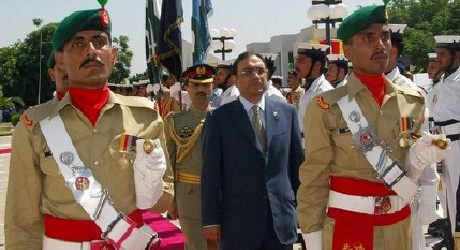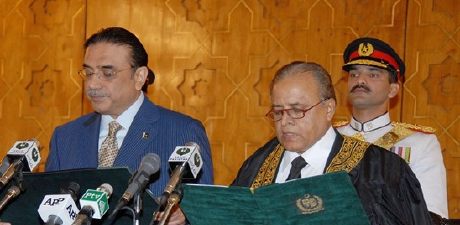Adil Najam
As our ongoing ATP Poll on what should happen after the NRO decision by by the Supreme Court shows, there are many options but little clarity on what will happen nexts. Ministers are being stopped at airports. Summons are supposedly being sent to Ministers. PPP leaders are coming to the defense of their colleagues. And the PPP is vowing to go back to the courts to clear their name. In short, uncertainty rules Pakistan politics, again.
This is clearly a challenging political moment for Pakistan. But it can also be a precedent-setting moment. A moment where the process of democracy and rule of law reconcile with each other without offending the basic principles of either. Uncertainty must not be allowed to morph into chaos, but the rule of law must also be maintained. If. Mr. Zardari and the PPP show political maturity in this moment, they could come out with more support than they had a week ago. But will they?
This editorial from Dawn seems to sum up many of the issues quite well.
In the immediate aftermath of the Supreme Court’s judgment on the NRO, the ever-churning political waters in the country have been stirred to a frenzy. Uncertainty, if not panic, is detectable in the ranks of the PPP brain trust as the judicial wheels have swiftly started turning with unknown consequences. Meanwhile, sections of the media have gone into overdrive against ‘tainted’ and ‘immoral’ NRO beneficiaries, regardless of whether the cases had resulted in convictions or not.
Panic, glee, consternation, joy — amid the welter of emotions, few have thought to step back from the cacophony and find a way to protect the system and the transition to democracy. The post-NRO political landscape need not degenerate into a zero-sum game where the fate of individuals is elevated in importance above the fate of the system.
First things first, the judicial process unfolding to take the 8,000-odd beneficiaries of the NRO to their pre-Oct 5, 2007 status must be conducted with deliberateness and thoughtfulness. It is a process with no precedent in the country and it should be guided by the experts, unaffected by the political polemicists with barely concealed agendas. At the moment, it seems anyone who may or may not have ever seen a legal textbook or may or may not know the difference between civil and criminal proceedings is expounding on the effects of the NRO judgment. Such ‘expertise,’ whether well-intentioned or not, is certainly undesirable. It is imperative that the judiciary in consultation with the relevant parts of the executive be allowed to develop a road map based on the Supreme Court’s judgment to restore the pre-Oct 5, 2007 position of the NRO beneficiaries — undoing an illegality, however blatant, must be done along legal principles, not political expediencies.
Next, the political forces on both sides must proceed with caution. The PPP-led government at the centre must resist the urge, if any, to ‘respond’ to its detractors. Instead, it must demonstrate a genuine will to implement the Supreme Court’s order and allow the law to run its course. After years, if not a decade, of claiming that ‘political persecution’ was behind the cases registered against its member, now is truly an opportunity for them to clear their names and get a fresh start. The opposition, meanwhile, needs to be mindful that any short-term ‘gains’ to be had by rocking the system can morph into long-term damage if it creates space for extra-constitutional forces to create mischief. The democratic system can emerge stronger from this watershed event, but only if everyone keeps one eye on weeding out corruption and the other on protecting the democratic system.
Meanwhile, our ATP Poll on what should happen next is still open; if you have not voted yet, please do.





















































Imams Abu-Dawod, Ibn-Majah and Ahmad reported that the prophet Muhammad (S.A.W.) said: “If any man involves himself in corruption while his people around him are capable of stopping him but choose not stop him, they will be afflicted with punishment from Allah before they die.”
Muslims are afflicted with various kinds of punishment. Their supplication is being ignored by Allah (S.W.T.). This is a direct consequence of halting enjoining what is good and forbidding what is evil. This will continue until we embrace Islam again in our lives.